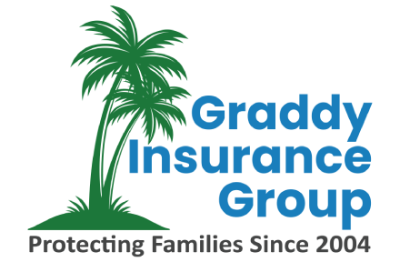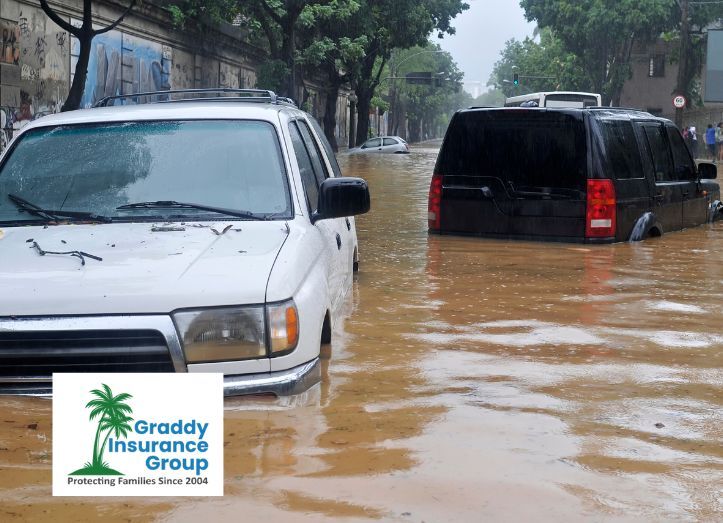What you need to know about your car insurance policy.
Shopping for car insurance in Florida? Whether you’re a new driver, relocating to the Sunshine State, or simply reviewing your auto insurance policy, understanding Florida’s unique insurance laws and coverage options is essential for protecting your vehicle and your finances.
Car Insurance is handled differently in Florida than in other states. Here are 9 crucial facts Floridians need to know about car insurance.
Key Takeaways on Florida Car Insurance
- -Car insurance in Florida is legally required and unique due to “no-fault” laws.
- -PIP and PD coverage is mandatory, but more protection is recommended.
- -Standard auto insurance does not cover damages caused by hurricane or flood damage, add comprehensive coverage.
- -Add liability coverage if you want to avoid being sued from an auto accident.
- -Uninsured Motorist pays for my injuries not my car’s damages, collision is need for the car.
- -Your credit score, driving record, and choice of coverages impact your rates.
-
Florida’s Minimum Car Insurance Requirements
To register your vehicle in Florida, the following limits are required:
- $10,000 in PIP, or Personal Injury Protection
- At least $10,000 PDL, or Property Damage Liability
While these are the state’s minimum coverage requirements, they provide only a baseline of protection and may not be enough to cover damages after a serious accident or disaster.
-
Florida Is a No-Fault State
Florida drivers benefit from unique “no-fault” auto insurance laws. This means:
- After a crash, your own insurance pays first for your injuries, no matter who caused the accident.
- Your Personal Injury Protection (PIP) covers your medical expenses up to the your policy limit, regardless of fault.
No-fault rules do not mean the at-fault driver is never responsible; lawsuits still happen for severe injuries or property damage.
-
The Role of a Personal Injury Protection (PIP) and Property Damage(PD) policy
The PIP/PD policy is the lowest limit policy required to register your car in Florida. PIP is designed to reduce the need for litigation and assures medical providers a minimum payment for emergency medical services. PD offers payment for minor vehicle damages.
Personal Injury Protection, or PIP, pays you a maximum of $10,000 from the following categories:
- 80% of bills for emergency medical care
- Up to $2500 for non-emergency medical care
- 60% of lost wages
- $5000 death benefit
Basic Property Damage (PD) pays the not at fault party up to $10,000 for any property that you damaged.
A basic policy will get you driving on the road but may not protect you or your bank account if you are involved in an accident. A trip to the ER can quickly exceed your $10,000 PIP coverage. $10,000 for Property Damage will not repair expensive or multiple vehicles involved in an accident.
Understanding how PIP and PD works is vital for all Florida car owners. Consider adding these other coverages to your auto insurance to better protect you.
-
Medical Payments Coverage Explained
While PIP pays for emergency medical needs, “MedPay” (Medical Payments coverage) is an optional medical coverage that increases your payout for accident injuries. It can pay additional medical expenses for you and your passengers regardless of fault and help with bills exceeding your PIP coverage.
-
How Uninsured and Underinsured Motorist Coverage Works in FL
One in five Florida drivers may be driving uninsured or underinsured. If you are injured in an accident caused by a driver with little or no insurance, you could be left with a lot of unpaid medical bills.
Be aware, in Florida, Uninsured Motorist coverage does not repair your car. If your car is damaged by a driver with no insurance, then you will have to repair the car yourself or file the damage with your own insurance policy, if you purchased Collision coverage.
By adding optional uninsured/underinsured motorist coverage (UM/UIM) to your policy, you and your family can:
- cover medical bills exceeding your PIP and Med Pay benefits
- receive a death benefit due to a covered accident
- offer future income loss or quality of life settlements in severe accidents
-
Liability Coverage: How it protects you and your financial assets
Like many other states, if you wreck someone’s car or injure them, then you are financially responsible for repaying them for the damage you caused. If you only carry a basic policy with PIP and PD, then your insurance carrier will pay up to $10,000 for the other party’s car repairs but ZERO to their injuries. This is because the basic policy offers no bodily injury benefits.
If you don’t add Bodily Injury Liability or increase your Property Damage Liability limit, you could be sued for those additional obligations.
Bodily Injury Liability is an optional but vital coverage if you want to decrease your chances of being sued after an auto accident. Bodily Injury Liability limits range from $10,000 to over $10,000,000. Your Florida insurance agent can help you decide what limits are right for your protection.
$10,000 Property Damage Liability limits are required on all Florida auto insurance policies. However, due to the cost of vehicles and their repairs these days, experts recommend increasing this limit to better cover damages and protect your assets.
-
Should you carry Collision or Comprehensive coverage?
If you lease or finance your car, your lender will require both collision and comprehensive insurance.
For Floridians who own their vehicles, no matter the age of the car, collision and comprehensive are optional but valuable coverages that should always be considered:
Collision pays for damage to your vehicle:
- from a crash with another car or object,
- if the car overturns, or
- is involved in a Hit and Run.
Remember, if you are hit by an uninsured/underinsured motorist, you will need to repair your car out of pocket if you don’t carry collision coverage.
Comprehensive pays for anything other than a collision, such as damage from:
- theft and vandalism,
- fire and smoke,
- weather related perils like hail, lightning, flood, or hurricane,
- animals, your own or nature’s pets.
Collision and Comprehensive coverage both carry a deductible from $0-$2000, which is the amount that you pay for using this coverage. However, in Florida, your front windshield will be repaired or replaced with zero deductible if you carry comprehensive coverage on your policy.
Florida is prone to hurricanes and floods, especially in coastal towns like Dunedin and Punta Gorda. Given weather risks and uninsured drivers in our area, most experts encourage adding both Collision and Comprehensive to your policy. The cost varies based on the vehicle type and value but is normally an affordable coverage compared to replacing your car.
-
How does your Credit Score, Driving Record and Carrier History affect your insurance premium?
Insurance companies in Florida often use many different factors when determining your auto premium. Age of drivers, vehicle types, garaging locations are just a few factors when determining your rate. Other major factors include:
- Your Insurance Score. Many people think that the higher your credit score the better your rate, but the actual number is not the only factor. Sometimes insurance carriers focus on specific details of your credit history, like payment history, outstanding debts and claims history to determine your likelihood of paying on time or filing claims. A better insurance score typically leads to lower rates.
- Driving Record: We all know that accidents and violations make insurance premiums increase. Most insurance carriers look back 3-5 years for incidents. The frequency and severity of each accident and violation are considered for eligibility and rate. Each carrier rates driving records differently. One may count not at fault accidents against you, where others may not like multiple comprehensive claims.
- Carrier History: If you have been insured with the same carrier for many years, then a new carrier may be willing to give you a better rate to switch. For drivers that jump from one carrier to another, you may not get the best rate due to the instability.
-
In Florida, What Happens If You Drive Without Insurance?
Driving without insurance in Florida is illegal and can have severe consequences:
- Drivers License and registration suspension
- Fines and large license reinstatement fees
- Higher insurance costs, premiums are higher for lapses in insurance
- Possible jail time for repeat offenses
- You can be financially responsible if you cause an accident
FAQs About Car Insurance in Florida
Does car insurance cover flood damage or hurricane damage?
No, basic policies do not. You need comprehensive coverage for protection against flood or hurricane-related damage to your vehicle.
Is Florida’s “no-fault” law the same as full coverage?
“No-fault” refers to how medical expenses are paid after an accident, but it does not mean you have complete (full) coverage. Additional insurance coverages are needed for more comprehensive protection.
Can my credit history really impact my car insurance rates in Florida?
Yes. A better credit history can be helpful to obtain lower premiums, however, insurance carriers look at more than just your credit score number. They consider specific parts of your credit history to establish an insurance score or rating factor.
What happens if I let my car insurance lapse?
It is illegal to drive a vehicle in Florida without insurance, so a lapse in coverage, even for a day, could be a huge financial hit for you. Your insurance carrier is required to report lapsed insurance policies to the Department of Motor Vehicles. Your drivers license will be suspended if your registered vehicle is not insured with minimum coverages.
If you are involved in an accident without an active insurance policy, you will face fines and your driver’s license will be suspended. You will be personally responsible for any injuries or property damages you caused in the accident. To reinstate your license, you may be required to carry higher insurance liability limits which means higher premium payments. And, you will pay higher rates for a new policy when your record includes a lapse of insurance.
Have more questions…Contact Graddy Insurance Group for Car Insurance in Florida
When it comes to protecting your Florida car correctly, whether from accidents, water damage, or hurricane season, you want a local insurance company that truly understands the risks and is there when it matters most. As your neighborhood insurance group, Graddy Insurance Group is here whenever you need us, with friendly expertise and coverage you can trust.


